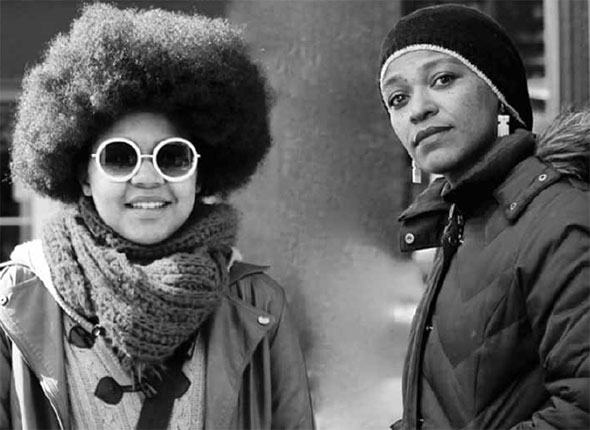Dr Shose Kessi and daughter Kinè Mokwena-Kessi on Women's voices and intergenerational lessons


(Shose Kessi, Department of Psychology)
I am glad to be a woman in 2015.
Throughout the world women are the ones who instigate meaningful changes in society. Community building is at the centre of what it means to be human, and women in 2015 are at the forefront of social and political life.
My mother and grandmother came from completely different walks of life: One is white and middle-class, the other African from a small village in the Kilimanjaro region. Navigating these vastly different spaces has made me the person I am today. My mother was very principled and unwavering in her commitment to helping others. I remember her as always calm, thoughtful, and insightful. I only knew my paternal grandmother; a strong woman who gave birth to nine children (one out of wedlock – my father) and raised many more. She was very strict and people feared her. But like my mother, she knew the value of discipline and principles. Both these women were grounded, courageous and self-confident, which equipped them to break the boundaries of what was considered acceptable behaviour in very different but conservative cultures. From these two women, I have learnt to be strong and respect others in all their diversity – and inspire fear when necessary.
I am grateful for the many sacrifices made by women who have enabled us to enjoy the freedoms we now have. However, there is still much that needs to change. High levels of physical, emotional, symbolic and structural violence against women still exist in our societies. My wish is that my daughter/our daughters can explore their lives to their fullest and not be constrained by oppressive patriarchal norms.
My daughter Kinè should be free to speak her mind, be bold, live wherever she chooses, love whomever she chooses, and go through life with respect for herself and others. My hope is that I have given her some of the tools to do just that.
Womanhood in context
(Kinè Mokwena-Kessi)
Being a woman in 2015 is akin to being a schizophrenic. I am not the same person legging-it down the daunting streets of Johannesburg, as I am meandering around the pavements in London, or shuffling along the dusty roads in Dar es Salaam. Womanhood is contextual and to be a woman is to have multiple personae you carry with you, like weapons you readily wield to shield yourself.
I recognise, as do most women, that if there were ever a time to be a woman it would be now. Just think, as a barely legal young woman 60 years ago, chances are, I would be whittling away amid dull domestic incarceration, having already shoved out my third child to a man my father's age. Now, my most pressing issue is where I go to university, which is again not a reality for scores of women across the globe.
Navigating a world in which we women fight to be free in thought, in speech, in action is as thrilling as it is vexing. Yet, it is precisely this complex balance between deep hardships and intoxicating victories in becoming a woman that I'm realising an extraordinary power. Through being made to feel threatened, I have come to realise that I am in fact extremely threatening. We women no longer know our place.
I am being raised by a single mother. I believe we have grown up together, and I am lucky enough to have a mother who I see as an individual, a multi-faceted person. My mother teaches me to be free.
In tune with the untraditional nature of my family, I have three vastly different grandmothers from vastly different backgrounds. From Soweto, Ouma has taught me ruthless resilience; from Devon, Grandma taught me the importance of eloquence and honesty; from Ireland, Mareena has taught me to choose my battles carefully – and to shut up strategically.
I was driving out of Durban earlier this week and we passed a billboard that frightened me. "RAPE IS A CRIME", it said in a big bold font plastered above the shiny forehead of some indifferent minister. How did we get to this profoundly disturbing place? The paralysing disgust I felt in the face of sexual, physical, emotional and systemic violence directed at the female body is what I fear most for my hypothetical daughter – especially if she were to grow up in South Africa.
Story taken from Monday Monthly (UCT)